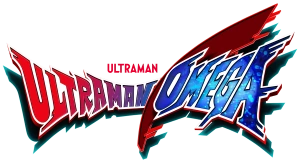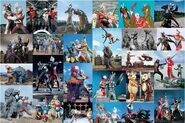Tsuburaya Productions is a Japanese special effects studio founded in 1963 by special effects wizard Eiji Tsuburaya and was run by his family, until October 2007, when the family sold the company to advertising agency TYO Inc. The studio is best known for producing the original Ultraman TV series, as well as the Ultraman Series. Since 2007, the Head Office has been located in Hachimanyama, Setagaya Tokyo, however, sometime after that, it has been relocated to Shibuya, Tokyo.
History

First established in 1963, it was responsible for the creation of such classic shows as Ultraman (and its many sequels), Kaiju Booska and many other spectacular Tokusatsu family/children's shows.
The company's current logo was originally the arrow-like logo from their 1968 TV series, Mighty Jack, designed by that show's art director, Tohru "Tohl" Narita.
The company, when first formed in 1963, was called Tsuburaya Special Effects Productions . In 1968, Toho Company Ltd. forced the company to change the name to just "Tsuburaya Productions," not only because they thought Eiji acted as though only he can do special effects, but they also felt that his own TV shows were becoming a strong competition to the movies he was doing for them. Although Eiji had strong political power at Toho, he and the company were at odds with each other until his death in 1970.
Their more recent work includes the "Ultra N Project" (ULTRAMAN and Ultraman Nexus) and Bio Planet WoO, based loosely on an unused concept which was planned before the production of Ultra Q, but never filmed.
World Record
In 2001 Tsuburaya's Ultraman Series was awarded by the Guinness Book of World Records for the most amount of television spin offs. In 2013, the record has continued to be upheld for a total of 12 years. In the 2014 edition of the book, the Ultraman Series was still listed as having the world record for the most spin-offs. The certification counts the 27 spin off series which were made at that time. This excludes remakes like Heisei Ultraseven, one off specials (movies), summaries and home releases. Although technically many of the shows were not originally meant to be sequels, they were retconned to be in a single multiverse.
Spinoff Series Listed in the Record
- Ultraseven (1967)
- Ultra Fight (1970)
- Return of Ultraman (1971)
- Ultraman Ace (1972)
- Redman (1972)
- Ultraman Taro (1973)
- Ultraman Leo (1974)
- The☆Ultraman (1979)
- Ultraman 80 (1980)
- Andro Melos (1983)
- Ultraman Kids proverb story (1986)
- Ultraman Kids mother asked the 30 million light years (1991)
- Ultraman Tiga (1996)
- Ultraman Dyna (1997)
- Ultraman Gaia (1998)
- Ultraman Cosmos (2001)
- Ultraman Boy's Ultra Coliseum (2003)
- Ultraman Nexus (2004)
- Ultraman Max (2005)
- Ultraman Mebius (2006)
- Ultraseven X (2007)
- Ultra Galaxy Mega Monster Battle (2007)
- Kanegon KANEGON (2008)
- Ultra Galaxy Mega Monster Battle: Never Ending Odyssey (2008)
- Ultraman Retsuden (2011)
- Ultra Zone (2011)
- Ultraman Ginga (2013)
- Ultraman Orb (2016)
- Ultraman Geed (2017)
- Ultraman R/B (2018)
- Ultraman Taiga (2019)
- Ultraman Z (2020)
Non-Ultraman Series
These are all of the series Tsuburaya has produced that isn't the Ultraman Series and is a form of tokusatsu.
- Kaiju Booska (November 1966 - September 1967)
- Mighty Jack (April 1968 - June 1968)
- Fight! Mighty Jack (July 1968 - December 1968)
- Operation: Mystery (September 1968 - March 1969)
- Chibira-kun (March 1970 - September 1971)
- Mirrorman (December 1971 - November 1972)
- Redman (April 1972 - October 1972)
- Triple Fighter (July 1972 - December 1972)
- Emergency Directive 10-4·10-10 (July 1972 - December 1972)
- Fireman (January 1973 - July 1973)
- Kyofu Gekijo Unbalance (January 1973 - April 1973)
- Jumborg Ace (January 1973 - December 1973)
- Mirror Fight (April 1974 - September 1974)
- Army of the Apes (October 1974 - March 1975)
- Pro-Wres no Hoshi Azteckaiser (October 1976 - March 1977)
- Dinosaur Expedition Born Free (October 1976 - March 1977)
- Dinosaur Great War Izenborg (October 1977 - June 1978)
- Star Wolf (April 1978 - September 1978)
- Dinosaur Squadron Koseidon (July 1978 - June 1979)
- Bokura Yakyu Detective Team (April 1980 - September 1980)
- Andro Melos (February 1983 - April 1983)
- Denkou Choujin Gridman (April 1993 - January 1994)
- Superhuman Samurai Syber-Squad (September 1994 – April 1995) (co-production with DiC Entertainment)
- Booska! Booska!! (October 1999 - June 2000)
- Otasuke Girl (June 2003 - August 2003)
- Mirrorman REFLEX (January 28, 2006) (Direct-to-DVD)
- Bio Planet WoO (April 2006 - August 2006)
- Mirror Fight 2012 (April 2012)
- Denkou Choujin Gridman: boys invent great hero (January 2015)
- SSSS.GRIDMAN (October 2018 - December 2018)
Collabs
- Daigoro vs Goliath (December 1972) with Toho
- The Last Dinosaur (Feburary 1977) with Ranken Bass
- The Bermuda Depths (Janurary 1978) with Ranken Bass
- Ultraman vs Kamen Rider (July 1993) with Toei Company
Corporate Buyout
Due to rising production costs and crippling loans, the Tsuburaya family sold the company to Japanese advertising agency TYO Inc. in September 2007, which bought out 80% of its outstanding shares worth ¥80 million.[1] Bandai, the main licencor of merchandise for the Ultraman Series, acquired a 33.4% stake in 2008[2] with TYO transferring another 15.6% in 2009 giving Bandai a total of 49.9%. As a result, the old Kinuta Office used by Tsuburaya as its Head Office was razed, and the company moved to newer facilities. Kazuo Tsuburaya, Eiji's grandson, stayed with the company on its board of directors.
Fields Corporation, a pachinko machine producer, bought out TYO's 51% stake in Tsuburaya Productions in 2010, with Bandai retaining the remaining 49%.[3]
Gallery
Photos
Videos
 Tsuburaya Productions Commercial 1995-0 |
 Ultraman Winter Memories |
|---|
External links
- The Official Tsuburaya Productions Webpage (English)
- Ultraman Galaxy Webpage (English)
- The Official Tsuburaya Productions Webpage (Japanese)
- Official Facebook page
- Official Twitter account
References
- a b The Official Tsuburaya Productions English Webpage company profile
- ^ If only 'Ultraman' was here to stop the wrecking ball Asahi Shimbun February 7, 2008 (English website)
- ^ 円谷プロの“聖地”にお別れ MSNSankei news February 6, 2008 (Japanese website)
- ^ Japanese book: The Man Called the "God of Special Effects" 特撮の神様と呼ばれた男 ISBN 4-901006-21-5
- ^ Japanese book: Eiji Tsuburaya: The Inheritance Left in the Japanese Film World 円谷英二 日本映画界に残した遺産 ISBN 4-09-681421-0
- ^ Sci-Fi Japan: Tsuburaya Productions Sold


